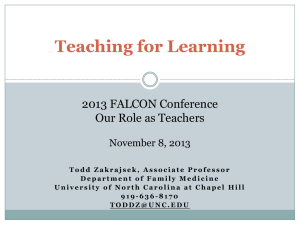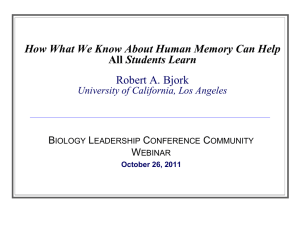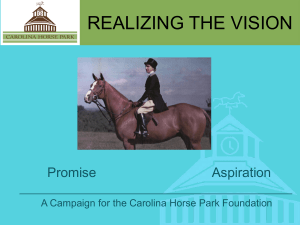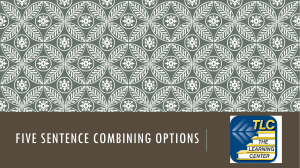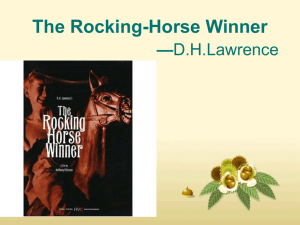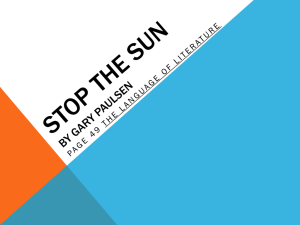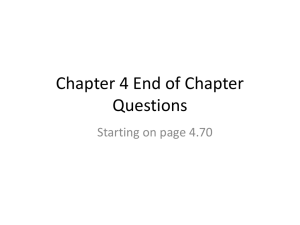False - Writing Centre
advertisement
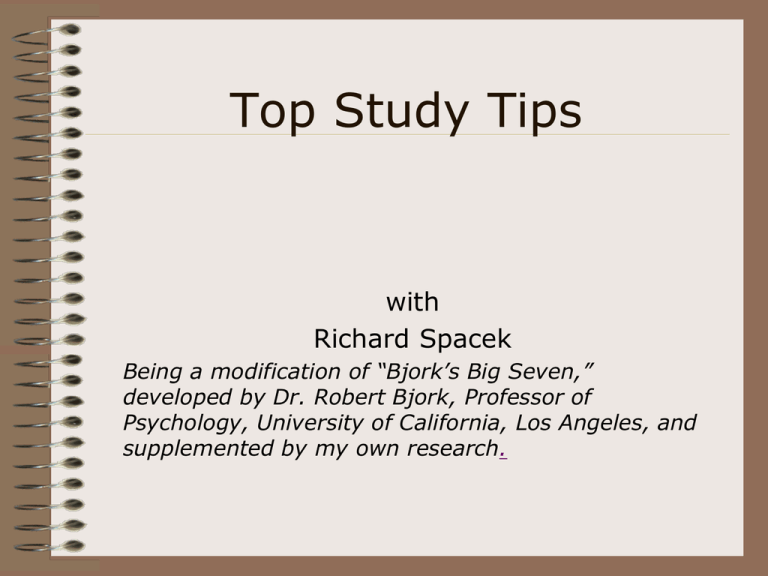
Top Study Tips with Richard Spacek Being a modification of “Bjork’s Big Seven,” developed by Dr. Robert Bjork, Professor of Psychology, University of California, Los Angeles, and supplemented by my own research. • Try the Neuromyths quiz! 1 False. • fMRI has repeatedly shown several brain areas at work during activities • There is no unused “reserve,” only some degree of specialization 2 • False. • Polyphasic sleep (more than two sessions per night) • Usually the result of illness • Often supplemented by daytime napping 3 • False. • 1993 study suggested better “spatial task performance” • Result of mood, not congnitive improvement • Learning a musical instrument does contribute to self-regulation and possible cognitive ability 4 • False. • Wakefield’s study was fraudulent and was withdrawn • He was stuck from the British Medical Register 5 • False. • Repairs are constantly carried out • “neuroplasticity” can help recovery in some serious cases 6. • False. • In certain areas, new neurons are formed constantly: hippocampus and olfactory bulb • Cells constantly regenerated 7 • True. • “spacing effect” is well documented • current research focuses on finding the ideal spacings 8 • False—BUT . . . • Damage to dendrites will occur as a result of chronic abuse • Vit. B1 deficiency can cause Wernicke-Korsakoff syndrome 9 • False. • Only physical trauma can create a hole in your brain • Key brain regions in drug addicted people may be reduced in size • Some drugs interfere with the way cells send and receive messages 10 • False. • Crossword puzzles and similar games can help you learn words and improve specific skills, but will not enhance overall brain function 11 • True. • regular exercise can help maintain memory and general cognition • Aerobic exercise increases blood flow to the brain, lessening rate of tissue loss during aging • John Ratey, Harvard: increases production of brain-derived neurotrophic factor (BDNF) 12 • False. • Both hemispheres work together in almost every cognitive task that has been studied • Something as broad (and illdefined) as “creativity” is not centered in one hemisphere. 13 • False. • Arzi et al. (2012) determined that sleeping subject could learn smells—but that’s about it! Bjork’s Big Seven • Bjork combined years of research into a system of key study activities • I have built on this The Big Seven 1. 2. 3. 4. 5. 6. 7. Concentrate Interpret & Understand Organize & Structure Information Space & Repeat Test, Retest/Generate, Retrieve Organize Time Recognize Physical Factors 1. Concentrate • Ever BLANK OUT while reading? • Ever notice that a lecture has moved on to a completely different topic while you “tuned-out”? • Ever driven miles while your mind wandered? Concentrate • If you feel yourself slipping right now. Stop! • Stand up; stretch • Tap your head three times while muttering “think”, “think”, “think” • Now refocus. Feel better? Attention, Please! • Decades of attention research show us 1. Dividing your attention between multiple tasks is inefficient (no multi-taking) 2. Attention cannot be sustained indefinitely Multi-tasking Multi-tasking is inefficient . . . • often an attempt to combine necessary with desired tasks • turn off the stereo • leave the residence • tell yourself that if you study/practice for 20 min. effectively then you’ll spend 5 minutes . . . doing those other things you might otherwise be doing Lecture Multitasking • “significant negative correlation between in-class phone use and final grades . . . corresponding to a drop of 0.36 plus or minus 0.08 on a 4-point scale where 4.0 = A” • “students cannot multitask nearly as effectively as they think they can” Concentration Killers • Alcohol • Depression • Interrupting reading with texting/messaging/email Exceptions • “separate perceptual domains” • Allows one to read while walking on a treadmill without interference • Writing while singing NOT so successful Limits of Concentration 2. A person can concentrate for a limited amount of time. • The duration of attention differs from person to person, from task to task. • You will know when you’ve reached your limit: your mind will start to wander Limits of Concentration • For lectures, give yourself a pep talk beforehand: • “Even the most boring lecture will end eventually.” • When you find yourself beginning to lose attention, try to think of a question to ask the instructor and write it down • Write one down now! Limits of Concentration • Study: more difficult (or more boring) subjects may require more breaks • Your ability to sustain focus tends to increase with practice • Fatigue, illness will decrease endurance Limits of Concentration • Example: You have 50 minutes to study • You will actually learn more by studying for 45 of those 50 minutes and then taking a short physical break for 5 min. Limits of Concentration • If you don’t take a break, your brain will go on one without you anyway. . . Possibly during the most important part of study • For every 50 minutes, study, practice, or self-test for 25, take a break for 5, and then start again for 20. Limits of Concentration • DON’T FORGET TO START AGAIN! • For the next 50 min. time period, you might notice diminishing returns from that 5 min. break. • You might find that you need a 10 min. break • Eventually your stamina will increase 2. Interpret & Understand • Read the following: 1. The exposure was insufficient because of the weather conditions. 2. The crash was due to the keys sticking. 3. The numbers slid down because of the crisis abroad. Interpretation • Interpretation can be thought of deep processing • Now try to recall the three sentences that you just read on the previous slide. Can you do it? • Fill in the blanks. . . . Interpretation • Remembering the sentences was probably difficult • They seemed meaningless • That which cannot be interpreted, cannot easily be recalled Interpretation • Read the sentences again: 1. The exposure was insufficient because of the weather conditions. (Taking a picture) 2. The crash was due to the keys sticking. (Computer break-down) 3. The numbers slid down because of the crisis abroad. (Stock-market) Interpretation • Context provides comprehension • Now try to recall the three sentences again. Interpretation • Other factors: you saw them before (repetition). • You tried to recall them once already (retrieval practice) • Repetition and retrieval practice are both crucial for learning & memory • Research suggests that the sentences with “clues” are easier to remember even at first sight, because you were able to interpret the sentences. 3. Organize/Structure • List the months of the year— write them down. • How long did that take you? • Did you get them all? Organization/Structure • Pretty trivial, pretty easy? • Now list the months of the year alphabetically. • How long did that take? • Are you sure that you got them all? Organization/Structure • A change in organization is a change in information Organization/Structure • Preview the chapters of textbooks • Look over section headings how chapters are organized • How many of you read the chapter summaries at the beginning (or end) of the chapters before you begin reading? Chapter-Level Organizers 4. Space/Repeat • You have 4 hours to study for tests in Class A & Class B. What do you do? • Do you spend two hours on Course A and then two hours on Course B? • Study Course A for an hour, then Course B for an hour, then Course A for an hour, then Course B. 4. Space/Repeat • Spacing your study in this way is an easy way to increase variability of encoding • Spacing your study increases retention 4. Space/Repeat • Each time you study something, you will encode the information slightly differently. • Especially when time intervenes between the two study sessions. • “encoding variability” Going Postal: Optimal Spacing • BPO: teaching typing to postal workers • Option 1: take workers off their jobs and give intensive typing training • Option 2: combine training with job and brief practice each day Typing Sessions 1. Two 2-hour sessions per day (total of 4 hours) 2. One 2-hour session per day (total of 2 hours) 3. Two 1-hour sessions per day (total of 2 hours) 4. One 1-hour session per day (1 hour) Results: Acceptable Standard Attained 1. 80 2. 78 3. 78 4. 55 hours hours hours hours Also, group 4 retained their competence better than group 1 “SPACING EFFECT” • Remember the curve of decay: • Knowledge initially declines rapidly, dropping by 80-90% within a week • Review material before forgetting • Brief reviews produce benefits • Spaced recall promotes long term memory: separate instances of effortful recall! Micro-distribution practice • Spaced presentation enhances memory • Landauer/Bjork method: • Test new item after short delay • As item becomes better learned, gradually extend the practice interval • Sample learning sequence: Micro-Distribution Teacher • • • • • • • • • • • • • Stable = l’écurie Stable? Horse = le cheval Horse? Stable? Horse? Grass = l’herbe Grass? Stable? Horse? Grass? Church = l’église Church? Learner l’écurie Le cheval L’ écurie Le cheval L’herbe L’ écurie Le cheval L’herbe l’église 5. Test, Retest • When you flip through your textbook taking note of the organization before you begin to read the chapter, try to generate questions. . . . Bjork’s Advice • Step number one: Take out your highlighting pen. • Step number two: Make sure your highlighter has plenty of ink. • Step number three: Throw away your highlighter!!! Read, Write; Don’t Highlight! • Testing is BETTER • Read a paragraph or two and test yourself: try to summarize • Check the textbook to make sure that you have correctly summarized the information • Correct as needed Generate, Retrieve! • All the time, try to make sense out of what you are learning (interpretation) • Using this very powerful technique may double if not triple your reading time—but it will produce results. Generate, Retrieve! • Retrieval practice. • How will you know you are ready to take the test and that you will do well on the exam? • PRACTICE RETRIEVING THE INFORMATION BEFORE THE TEST!!! Generate, Retrieve! • Retrieval practice provides very effective feedback. • Immediate knowledge of performance • Even better, retrieval practice makes the information more likely to be remembered the next time you try to retrieve it! Test Write the French for . . . . • Stable • Stable = l’écurie • Horse • Horse = le cheval • Grass • Grass = l’herbe • Church • Church = l’église 6. Organize Time • “time management and selftesting were generally stronger predictors of . . . academic performance than aptitude” Time Thief: Video Games • “81% of American youth report playing at least once per month • C. 9% of 8-18 year olds are pathological users • “consistent negative associations between liking to play violent video games and school performance” Organize Time • Schedules reduce stress, ensure performance • They must be designed realistically and they must suit you • schedules build habits and habits can work for you! Fight Procrastination • Beat procrastination with a limited commitment • Promise to spend just 25 minutes on a large task • Once you are working, delay quitting—perhaps 10 minutes • Extend as necessary TM Workshop • For more on Time Management, attend our next TM workshop • Or download our slideshows: www.unbwritingcentre.ca/Workshops 7. Study Environment a) Light b) Day vs. Night c) Height d) Distractions, internal and external a. Daylight • Lighting (100 watts times 2 or actual daylight • Improves concentration, makes study more efficient • Improves mood Four Oaks Elementary • Wholly “daylit” school • Scores 7% ABOVE average • Destroyed by fire • Students moved to trailers • Scores 10% BELOW average • New daylit school: 9% above average b. Day vs. Night • Most are more efficient in daytime • Try to reserve low priority tasks for the night • The later the hour, the lower the challenge should be • “Sleep on it” tasks c. Height • Big debate: standing vs. sitting • Standing increases alertness • Probably less injurious to health • Ideal: have at least one work space at which you can stand part of the time d. Distractions • Use the “spider technique” to overcome your response to a distractor • Make a “symbolic” response • Transition to none at all The End • What about those questions you wrote down? Want to know more? go.unb.ca/wss www.unbwritingcentre.ca/Workshops
